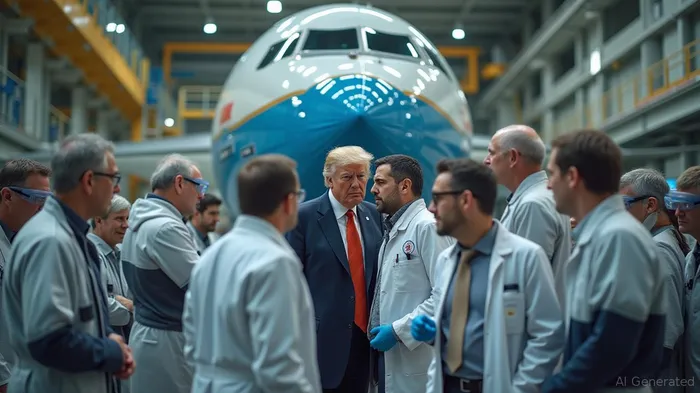Boeing Faces 5-Year Delay on Air Force One Project Due to Labor and Design Issues
Boeing’s Air Force One project has encountered significant delays and cost overruns, with the manufacturer facing persistent labor and design challenges. The Government Accountability Office (GAO) highlighted ongoing design issues, modification rework, and workforce challenges as the primary obstacles. The Trump administration procured a $400 million jet from Qatar to serve as an interim Air Force One due to these delays.
The Pentagon reported that the progress of modifying two BoeingBA-- 747-8 aircraft into presidential aircraft has been hindered by design issues, modification rework, and workforce challenges. The United States signed a $3.9 billion contract with Boeing in 2018 to have two planes designed, modified, and tested to serve as Air Force One by 2024. However, persistent delays have pushed the project past its delivery date.
Boeing needs to heavily modify the jets to meet travel and top-level security needs, which has slowed down the production process. The aircraft manufacturer has also been unable to keep a steady workforce for the project. The GAO report indicated that Boeing still faces challenges hiring and retaining qualified mechanics due to ongoing market conditions. Program officials stated that approval rates for mechanics to acquire necessary clearances remain a workforce limitation.
Last fall, Boeing announced plans to lay off 10% of its workforce, despite industrywide talent shortages. As Boeing tries to push through its scheduling woes, the Trump administration procured a jet from Qatar in February to find alternatives to the VC-25B project. The gifted Qatari jet has raised ethical and security concerns and will likely cost taxpayers $1 billion to service and update the jet to Air Force One standards.
The 10-digit chunk of change is on top of the projected development and procurement cost of the two Boeing aircraft, which is nearly $6.2 billion—at least $2 billion more expensive than the cost originally outlined in the contract. Boeing and the Pentagon did not respond to requests for comment.
Years of delays have plagued the Air Force One project. Though Trump commissioned Boeing for the new jets during his first term, there’s a good chance the president will likely not fly on the new Air Force One during his administration. In February 2024, Boeing revised its delivery schedule from May 2027 to December 2029, but a Boeing senior official told that the program could stretch “years beyond” 2029.
The issues plaguing Boeing’s production now look similar to the delaying variables from years past. In a June 2022 GAO report, the auditors said Boeing’s aircraft mechanic workforce was limited because of a competitive labor market and that many of the skilled workers needed on the project were unable to get security-clearance approval. Employees must meet stringent security requirements to work on the VC-25B program because of its presidential mission. Boeing continues to work with the program office to improve the prescreening process for applicants to ensure timely processing of security clearances.
Earlier in Trump’s second term, Boeing sought help from Elon Musk, then leader of the Department of Government Efficiency. Boeing CEO Kelly Ortberg said at a conference in February that the advisory has some production bottlenecks. Musk visited Boeing’s San Antonio facility in December 2024. The president’s clearly not happy with the delivery timing. I think he’s made that well known. And Elon Musk is actually helping us a lot. 
Quickly understand the history and background of various well-known coins
Latest Articles
Stay ahead of the market.
Get curated U.S. market news, insights and key dates delivered to your inbox.

Comments
No comments yet